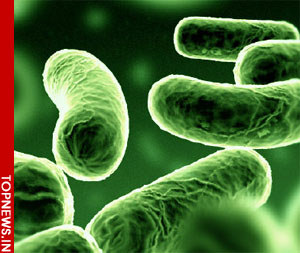Bacteria may power tomorrow’s energy needs
 Washington, May 19 : A new research has indicated that microscopic organisms like bacteria and microalgae are biological factories that are proving to be efficient sources of inexpensive, environmentally friendly biofuels, which would help solve the looming fuel crisis in the 21st century.
Washington, May 19 : A new research has indicated that microscopic organisms like bacteria and microalgae are biological factories that are proving to be efficient sources of inexpensive, environmentally friendly biofuels, which would help solve the looming fuel crisis in the 21st century.
"We have been charged to develop the next generation of cellulosic biofuels. When we successfully supply sources of energy to the grid from non-food, cellulosic, parts of plants we will mitigate the food versus fuel debate," said Tim Donohue of the University of Wisconsin, Madison, one of two directors of Department of Energy Bioenergy Research Centers.
Researchers are currently looking at alternate biomasses as food for microorganisms to ferment into ethanol.
The key to ending the food versus fuel debate is unlocking the sugars trapped in cellulosic biomass.
Martin Keller at Oak Ridge National Laboratory, the DOE bioenergy research center director, and his lab are testing poplar tree samples for their ability to give up sugars.
"We for the first time ever have developed a super-screening pipeline to handle thousands of samples. We took samples from approximately 1,300 poplar trees in the northwestern United States and used the screening pipeline to see if there was a difference in sugar release," said Keller.
The researchers are now conducting experiments, growing poplar saplings under controlled environments to better understand.
In addition to studying the biomass itself, Keller's lab is also looking for microbes or microbial products that can help break it down into simple sugars.
They are currently studying a bacterium found in a hot spring in Yellowstone known as Anaerocellum.
It grows at approximately 80 degrees Celsius and is what is known as a consolidate bioprocessing microbe. It can not only break down the cellulosic biomass to sugars, but also ferment it to acetate and ethanol, saving time and money.
Beside ethanol and biodiesel, researchers are also looking at producing hydrogen from renewable resources.
Donohue's lab is working with purple bacteria that use photosynthesis to produce hydrogen from a combination of cellulosic feedstocks and sunlight.
The hydrogen can then converted to electricity using fuel cells that his lab is also developing.
They have completed laboratory scale prototype "microbial batteries" using the bacteria and the fuel cells in a single enclosed system that, when exposed to sunlight, produces enough electrical current to power a laptop.
"This is just a look under the hood at the types of activities that are going on in the United States to take advantage of microbial activities and deploy them to create the next generation of fuels," said Donohue. (ANI)